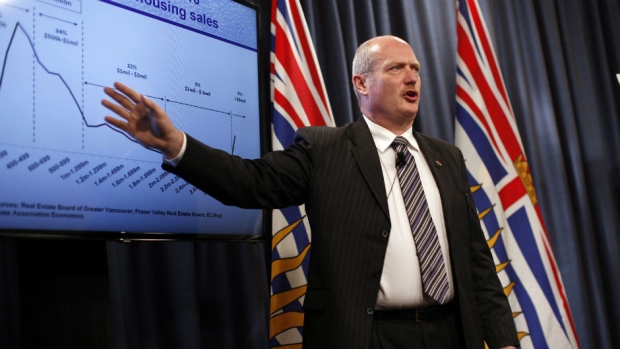Several critics are joining the B.C. government in urging Ottawa to crack down on tax cheaters and toughen existing rules, after a Globe and Mail investigation uncovered possible tax evasion and fraud by real estate speculators in Vancouver’s overpriced market.
The province’s Finance Minister called on the Canada Revenue Agency Saturday to “diligently” enforce the law, indicating he will pressure his federal counterpart, Finance Minister Bill Morneau, to make improvements.
On Sunday, Mr. Morneau’s office referred all questions to the Canada Revenue Agency. The Globe also asked to speak to the minister responsible for the CRA, Diane Lebouthillier, but she was not available.
The Globe investigation revealed how real estate speculator Kenny Gu paid next to nothing in taxes last year, while millions of dollars flowed through his personal and corporate bank accounts.
Documents suggest he is among a network of speculators who flip homes for a profit, then dodge taxes by classifying multiple homes as principal residences, when they don’t live in them. The sale of any principal residence is tax free in Canada.
“Like all taxpayers, I am concerned about allegations that some are not paying their share of taxes,” B.C. Finance Minister Mike de Jong’s statement said Saturday.
“For Canadians to have confidence in the tax system, the CRA must diligently enforce the law.”
“I have and will continue to communicate this expectation to Finance Minister Morneau and the federal government.”
Critics said Ottawa could take immediate steps to fix some of the problems highlighted in The Globe investigation.
For example, experts suggested it could require all taxpayers who sell a residential property to submit a form to the CRA that already exists.
Currently, the tax agency requires homeowners who sell a principal residence to designate it as such, on a standard form. They don’t have to report the sale with their tax return, however, just keep the form in their records. That means taxpayers can buy and sell multiple homes without telling the CRA.
“It’s a no-brainer,” said Vancouver immigration lawyer Richard Kurland, who said he has made several suggestions to governments on how to improve the system, but they have fallen on deaf ears.
“They should be collecting that information. It’s an easy fix. I don’t understand why it’s easy to send your charity receipts and difficult to send in your real estate receipts.”
Mr. Kurland also suggested the provincial government should share data with Ottawa, already collected on every property sale, on whether the seller is a resident of Canada for tax purposes. He said he’s been pushing B.C. to do that for two years, because the CRA could then compare property sales data with individual tax records.
He said the Clark government told him that would go against its belief that governments shouldn’t intrude too much into a citizen’s private business.
“It’s a question of political philosophy. I have been told that,” said Mr. Kurland.
B.C.’s opposition housing critic David Eby also called on governments to share more information.
“There are countless things that B.C. could be doing to assist CRA and bolster efforts to clamp down on tax evasion, money laundering and fraud,” Mr. Eby said.
He is pushing the Clark government to hire more provincial auditors to scrutinize tax and real estate records and share what they find with the CRA.
“This kind of conduct is corrosive to people’s belief that they need to follow the rules, if it seems like nobody’s watching and nobody cares,” Mr. Eby said.
Federal Conservative finance critic Lisa Raitt suggested that any changes to the federal tax code would have to be pursued carefully. “It is such a blunt instrument,” she said. “What you are attempting to do in Toronto or Vancouver specifically, you have to watch the effect is has on Halifax and Calgary.”
She also suggested it still might be difficult to crack down on cases where primary residence exemptions are falsely claimed, even if the CRA required taxpayers to submit all the paperwork. The problem, she said, “is not an easy fix, but it is something worth studying.”
The CRA sent The Globe a statement Sunday, which repeated its earlier statements on the issue.
“The Minister of National Revenue is committed to make it easier for the vast majority of Canadians who pay their fair share to do so, and more difficult for the small wealthy minority who do not,” the statement said.
“Audits related to real estate property transactions are currently being conducted across the country, especially in the Greater Toronto Area and in the Vancouver Mainland where such transactions are now the subject of greater scrutiny.”










